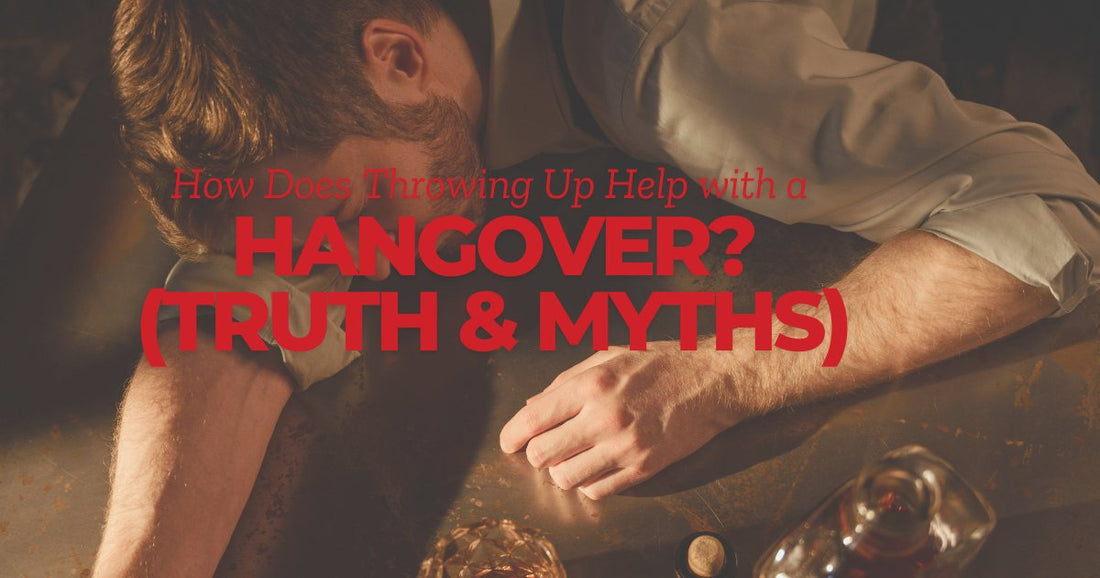
How Does Throwing Up Help with a Hangover? (Truth & Myths)
Share
Introduction
After a night of heavy drinking, you might feel nauseous and wonder: Does throwing up help with a hangover? Some people believe vomiting helps get rid of alcohol faster, easing symptoms like dizziness, headaches, and nausea. But is this really true?
In this guide, we’ll explore whether throwing up actually helps a hangover, when it might be beneficial, and the best science-backed recovery methods.
Why Does Alcohol Make You Nauseous?
Drinking too much alcohol can upset your stomach and trigger nausea due to several factors:
- Irritation of the Stomach Lining: Alcohol increases stomach acid, leading to irritation and nausea.
- Acetaldehyde Buildup: When alcohol is broken down in your liver, it produces acetaldehyde, a toxic compound that contributes to nausea and headaches.
- Dehydration: Alcohol is a diuretic, causing fluid loss and worsening symptoms.
- Delayed Stomach Emptying: Drinking slows down digestion, making you feel bloated and nauseous.
Does Throwing Up Help with a Hangover?
When Vomiting Might Help
Throwing up might provide temporary relief in specific situations:
✔️ If you still have alcohol in your stomach: If you vomit shortly after drinking, you may remove some of the alcohol before it fully enters your bloodstream. This could slightly reduce intoxication.
✔️ If you feel extremely nauseous: Vomiting can sometimes relieve stomach discomfort, but it won’t actually cure a hangover.
Why Throwing Up Doesn’t Cure a Hangover
❌ Most alcohol is already absorbed: By the time you wake up with a hangover, alcohol has already entered your bloodstream and been metabolized. Vomiting won’t remove it.
❌ Dehydration worsens: Vomiting leads to additional fluid loss, making hangover symptoms like headaches and dizziness worse.
❌ Stomach acid irritation: Repeated vomiting can damage your stomach lining and esophagus, leading to more pain and discomfort.
Learn more with Zinnia Health
The Risks of Throwing Up After Drinking
1. Dehydration and Electrolyte Loss
Vomiting causes fluid and electrolyte loss, leading to:
- Dizziness and weakness
- Severe headaches
- Increased nausea and dry mouth
2. Stomach and Esophagus Damage
Frequent vomiting exposes your esophagus to stomach acid, which can cause:
- Heartburn and acid reflux
- Irritation and inflammation
- Long-term damage if repeated
3. Increased Risk of Choking
If you pass out after drinking, vomiting in your sleep increases the risk of choking and aspiration pneumonia, a serious condition where vomit enters your lungs.
⚠️ Important: If someone is unconscious and vomiting, turn them on their side and seek medical help immediately.
Better Ways to Recover from a Hangover
Rather than forcing yourself to throw up, focus on science-backed hangover remedies that actually help your body recover.
1. Rehydrate with Electrolytes
- Alcohol causes dehydration, leading to headaches and fatigue.
- Drink electrolyte-rich fluids such as:
- Coconut water
- Sports drinks
- Electrolyte-infused water
2. Eat Gentle, Nutrient-Rich Foods
-
Best foods for recovery:
- Bananas – Restore potassium levels.
- Toast or crackers – Settle your stomach.
- Eggs – Contain cysteine, which helps break down acetaldehyde.
- Ginger tea – Soothes nausea.
3. Rest and Let Your Body Recover
- Sleep is crucial for hangover recovery.
- Avoid caffeine, which can dehydrate you further.
4. Support Liver Detox with Antioxidants
- Take Vitamin C and Zinc to support liver function.
- N-Acetyl Cysteine (NAC) helps neutralize toxins.
Frequently Asked Questions
1. Does throwing up remove alcohol from your system?
- No. Alcohol is absorbed quickly, and by the time you wake up with a hangover, most of it is already in your bloodstream.
2. Should I force myself to throw up after drinking?
- No. Forced vomiting can cause dehydration and damage to your stomach and esophagus.
3. How long does alcohol stay in your system?
- Alcohol is metabolized at about 0.015% BAC per hour. Most people sober up in 12-24 hours, depending on the amount consumed.
4. What’s the fastest way to cure a hangover?
- Hydrate with electrolytes
- Eat nutrient-rich foods
- Get plenty of rest
- Take antioxidants to support liver detox
5. Does drinking water before bed prevent a hangover?
- It helps, but it won’t completely prevent a hangover. Pairing water with food and electrolyte-rich drinks is more effective.
Conclusion and Best Recovery Tips
While throwing up may offer temporary relief, it does not cure a hangover. Instead, vomiting can make symptoms worse by causing dehydration, stomach irritation, and electrolyte loss.
Best Ways to Recover from a Hangover:
✅ Hydrate with electrolytes
✅ Eat light, nutrient-rich foods
✅ Get plenty of rest
✅ Support liver detox with antioxidants
Try a Hangover Recovery Supplement!
For fast relief, consider a science-backed hangover supplement with electrolytes, vitamins, and liver-supporting antioxidants.
Looking for a fast and effective hangover cure? Try Hangover Cure now for rapid relief and hydration!
For more expert recovery tips, read more on the Hangover Cure blog. 🚀

